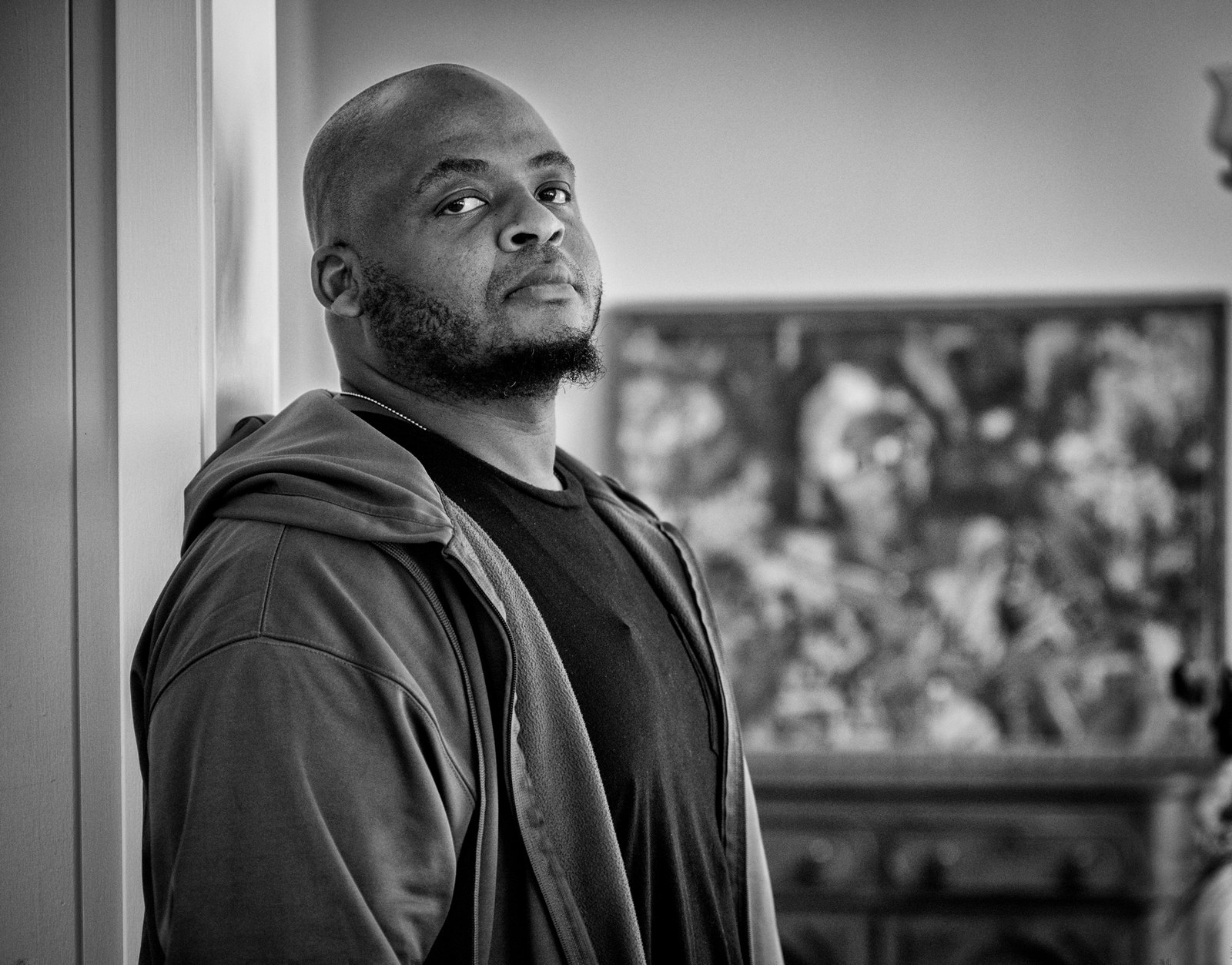To visit the writer Kiese Laymon in the town where he lives and teaches, you have to fly to Memphis International Airport in Tennessee and then, if you don’t drive, like me, hitch a ride from there to Oxford, Mississippi. Laymon, 44, offered to pick me up. He was almost apologetic when he extended the offer, but it stems from a well-honed generosity: Giving rides is a service he’s used to performing for out-of-town guests. En route, as we discussed the specific intimacy of knife crime, he obligingly lowered the volume on Solange and Lil Wayne so I could illustratively play him Ghetts’ verse from Stormzy’s “Bad Boys” (sample lyric: “big spear that a’ go through your belly”). Driving past fields of juvenile cotton plants as we drew closer to Oxford, Laymon issued a quick note of caution about the “brutal niceness” of the town.
“When black folks come to town, I just want to make sure they know where they’re coming,” he said. Then, eyebrows raised knowingly, he told me about the presence of a Confederate monument right in the town square. A few minutes later, when we pulled up to the hotel I was staying in, Laymon smilingly pointed out the black wedding party making use of the Gertrude C. Ford ballroom. In the lobby hangs a 2008 piece by an artist named Alfred Nicols. It’s called “Rebel Sunset.” Race in Mississippi has long been a complex dance — this was just another example.
It’s also been a throughline in a lot of his work. His writing — fiction and nonfiction alike — is all about the things he’s studied and known and lived through. His debut novel, Long Division (2013), took on, among other topics, the trauma of Hurricane Katrina and the tyranny of the American school system. His nonfiction essays have evocative titles that linger long after you’ve finished reading: “How to Slowly Kill Yourself and Others in America” (which became the title essay of his first collection, also published in 2013); “You Are the Second Person” (about race and publishing); “What I Pledge Allegiance To” (about the performance of American patriotism); “The Worst of White Folks”; “I Am a Big Black Man Who Will Never Own a Gun Because I Know I Would Use It” (self-explanatory), and so on. Heavy is already a finalist in the Kirkus Prize and has been long-listed for an Andrew Carnegie Medal for Excellence. This month, the city of Jackson awarded him a key to the city for his “literary genius.”
Laymon’s early life and work is rooted in Mississippi. Like Faulkner, whose one-time home is a stone’s throw from his, and whose fictional county, Yoknapatawpha, appears in multiple works, Laymon can’t get away from this place in his writing. It’s there in Long Division, in which Citoyen is sent from the home he shares with his mother in Jackson to his grandmother’s house in the fictional Mississippi town of Melahatchie, only to discover a portal to the future and the past. Mississippi appears almost without fail in his many personal essays, sometimes right in the first line, as in his 2012 Guernica essay, written when he was in upstate New York, Hey Mama: “Hey Mama, I’m feeling alone this morning. I miss Mississippi. I miss you.” His home state is the hub of his identity, one he left behind for a long time, working as an adjunct professor in upstate New York at Vassar College. (There’s an essay about that, too: “My Vassar College Faculty ID Makes Everything OK.”)
The roadmap of his projects over the years — which have encompassed the many tendrils of white supremacy, from entrenched poverty and college sports to toxic masculinity and gun violence — has been leading to this memoir, which arrives at a time when the worst of white supremacy is being given a national and international stage. Laymon has long been one of the canaries in the coal mine of (specifically) the American condition, with essays that have been unafraid to dig into his own life to lay bare the many contradictions that have made him the man he is today. In his latest work, Heavy, explorations of addiction sit side by side with examinations of entrenched patriarchy and the constant presence of deep familial love that is sometimes expressed in the worst ways. It is his most personal work, an unblinking look to a past that is full of the twin wellsprings of love and pain, the results of which are in plain sight in the Kiese Laymon of 2018.
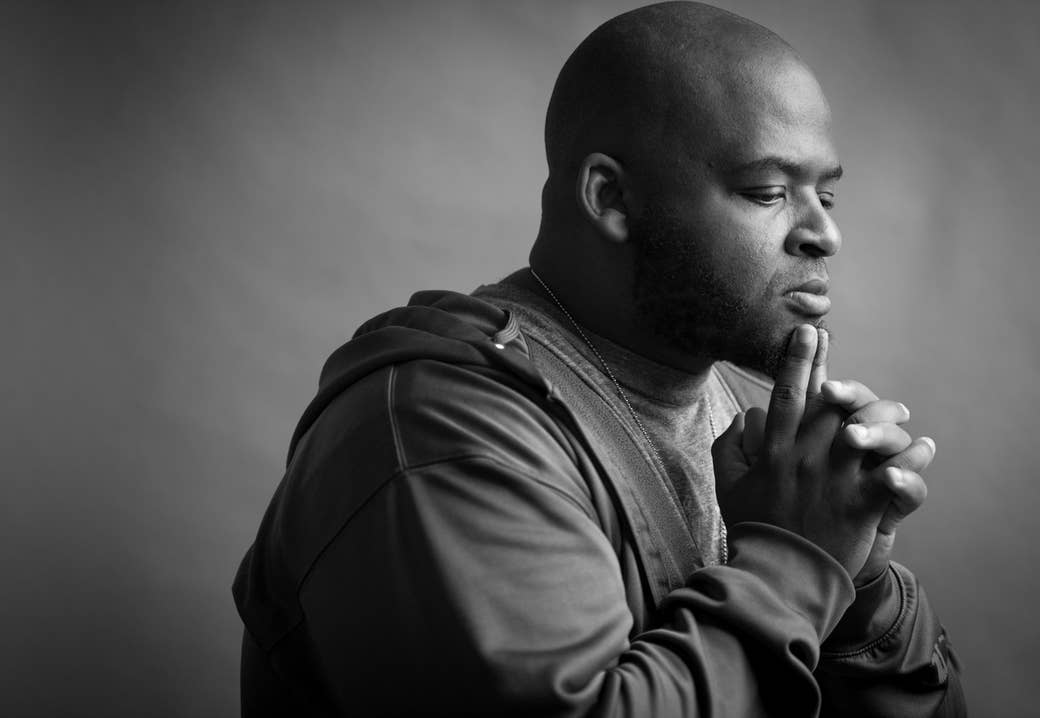
Imagine Laymon sitting on the front porch of his Oxford, Mississippi, home, wearing a pair of long camo shorts and a black T-shirt and red New Balance shoes. Imagine him talking with his hands and maintaining the kind of unflinching eye contact that feels entirely sincere. Listening to him speak, it is impossible not to note that if you’ve read his work, his cadence is instantly familiar because Laymon writes like he speaks, which is to say his style is full-on conviction, and ease in that conviction. When I ask him why he’d come back home to Mississippi, bearing in mind its unique place in not just the American imagination but also in the black American imagination, he says, “I mean, I moved back because it’s so specific.” For the longest time, Laymon was hyper-specific, saying he was from Jackson, not Mississippi.
Laymon attended Millsaps College in Jackson — where the college president shut down the campus paper in response to a satirical essay Laymon wrote (he was later suspended for taking a book without checking it out) — and then Jackson State before he left the region for Oberlin College in Ohio. The story of how Laymon came to leave Mississippi is largely covered in perhaps his most famous essay, “How to Slowly Kill Yourself and Others In America,” first published in 2011, and republished by Gawker in 2012. “This is a lame attempt at remembering the contours of slow death and life in America for one black American teenager under Central Mississippi skies,” he wrote, and in the wake of Trayvon Martin’s death and the subsequent acquittal of the man who killed him, the essay spread like wildfire and resonated deeply for readers.
“I should’ve gone to therapy but instead I came back to Mississippi.”
Following an MFA at Indiana University, he began teaching as an adjunct professor at Vassar College in 2001. He was 26. His long Vassar years made the South feel further away than ever. “It got to the point where I had lived in New York longer than I had lived anywhere. I kept writing about Mississippi but then I was like, man, I’m writing about this shit all the time but is it really home any more?” Homecomings are undeniably rose-tinted. “Part of me was definitely on that romantic, like, I gotta come back home to the place that made me, but [this is] not home. My grandmother’s porch and her old house is home.” It was a sick grandmama and the feeling that he had outgrown Vassar that compelled his return. “I needed to finish my book and I just couldn’t. I came back to be closer to the place that made me and made my grandmama, it made my mama. I just needed...I needed help.” His laugh was rueful. “I should’ve gone to therapy but instead I came back to Mississippi.”
Laymon returned to Mississippi as a John and Renée Grisham Visiting Writer in Residence fellow in 2015, and it was only after fielding offers following that residency that he chose to stay at Ole Miss, where he’s a creative writing professor. “I ended up here literally because they do have, I think, the best English and creative writing programs in the country. But” — a delicate pause in which you can almost hear him weigh the words — “they just gave me the most money, you know? [In] our state, people who can run often do run. And not many people run back. With the exception of Margaret Walker, when [the black writers] left, they left. The Deep South feels like a country to me. It feels like a nation. And I felt like I left it. And I came back primarily because I was unhealthy and I needed some...something.”
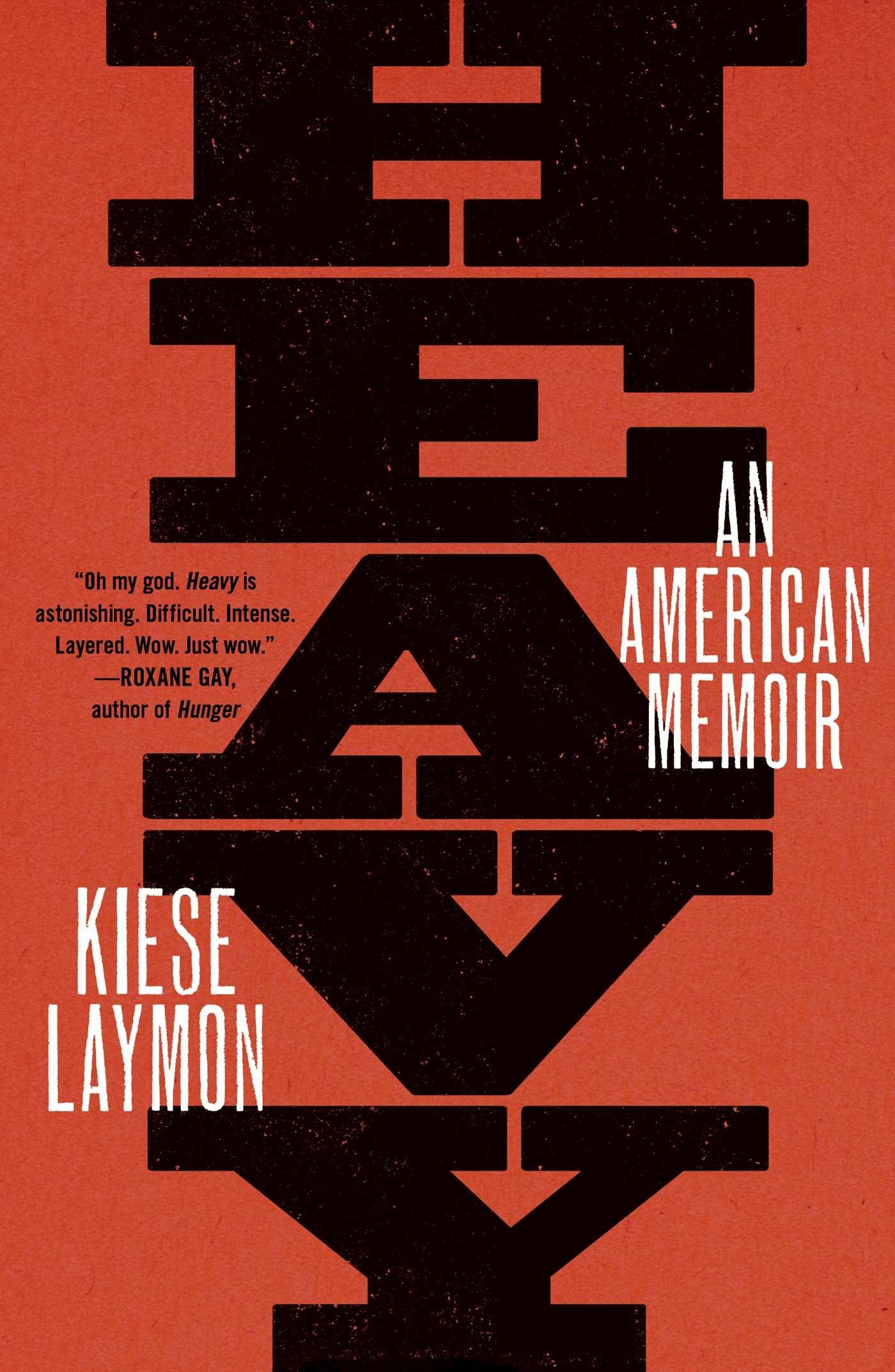
While his new memoir, Heavy, is not therapy, it is startlingly open, even by the standards of memoir. Written in four sections, the book is addressed throughout to Laymon’s mother, who appears as the ubiquitous “you.” In it, starting from his childhood, Laymon draws on experiences that have shaped him — most constantly his loving but complicated relationship with his strict college professor mother who had him at 19; the childhood sexual abuse he survived at the hands of one of his mother’s students; his weight; the joys and learned behaviours of black Southern masculinity; and his adventures in academia, addiction, mental health, and so on. It ends with his return to Mississippi and a conversation with the “you” — his mother. In content, the title is apt in every way.
Early in Heavy, Laymon recounts a police stop in Maryland while he is in the car with his mother. His mother, who has been polite through gritted teeth, looks to soothe her fuming teenage son and tells him: “Never give them a chance to take the shot. They will take it. They will take it. They will take it.”
“The black women in my family are like: Do not, ever, show these people who we really are,” says Laymon. “Our beating heart, our flowing blood, our emotiveness. Don’t let them see that shit. Deception and misdirection is how black people — and I think black women specifically — stay alive. But when I’m writing? I just don’t wanna do that shit.”
Laymon continues to open himself up in his writing, a direct rebuke to his mother’s advice, a kick at the white gaze and white supremacy that swirl around him (“the gaze is real, it destroys motherfuckers”). For a time, all he wanted to do was physically fight it: get bloodied in the course of bloodying someone else’s nose. Open up his raw, and let the world have at it. The bloodlust has morphed into something more pacifist, but he continues to confront the historical and contemporary white appetite for black pain, which he calls “the most unquenchable appetite in the world, maybe next to the appetite that men generally have for women suffering.”
“Deception and misdirection is how black people stay alive. But when I’m writing? I just don’t wanna do that shit.”
At the end of a chapter in which he explores the mixed emotions that come with a secret relationship with a white girl and ties it to the beating of Rodney King, he writes: “I was a liar, a cheater, a manipulator, a fat, happysad, bald-headed black boy with a heart murmur, and according to you and the white girl I lied to every day, I was a good dude.”
He is keen on honest self-reflection. “I just feel like everything in the world encourages me to lie...and so when I’m writing, I just want to try as hard as possible not to,” he tells me. Even so, he acknowledges the usefulness of lies. “I was raised by black women who really believed that that rawness you talk about is more than real. And if you let people into that raw, they will more than poke you.”
In addressing his mother throughout the book, Laymon knew he was putting it all out there. She responded to Heavy in a letter he published on his website in June. (“These are your memories — your renderings. I will not dispute them.”) He felt the tug between loving someone and knowing they may have caused you harm, and reconciling those two things. He ended up revising and cutting parts of the original version he’d given to her. “The direct address was my way of embracing that contradiction of ‘you love somebody enough to kill for them but you don’t love ’em enough to talk to them honestly about what you did to them yesterday.’ That’s us. That’s America. It may be the whole world, but I know that’s America. And I just wanted to write a book, to my mama. Really, to my mama. And then have the world figure it out, if they want to.”
His writing style is intimate, almost female in its capacity to turn the knife inward and keep peeling in a way that skates close to self. “On one hand, I write the way I write because my mother and my grandmother encouraged me not to write that way most of my life,” he says. “But also, I listened to them talk to one another. And sometimes in private, I would hear my mother and my grandmother and my aunts talking in a way that I had never...just nothing I had read sounded like that. Maybe some [Toni] Morrison sounded like it, but I just heard them reckoning in a way that I wanted do in my art. His writing is chock-full of local AAVE dialects too: “I know English. I know all the rules. I read damn near all the books. I mean, I literally have to read all the books!” He laughs. “So if I wanna fuck around with the language, I can do that. Because my mama created a fucking reading machine.”
He’s aware that the content of Heavy will open it up to critiques along the lines of titillation and trauma porn. He’s ready, kind of. He knows it’s a product but he also thinks it is still art, and more importantly, art that will find its audience.“That ‘you’ is a black woman. It’s a black, Southern woman,” he says. “But black Southern women are lots of shit. So I’m hoping people can find portals of entry into it, but if you don’t, I know one group of people in the country, or in the world, hopefully will.”
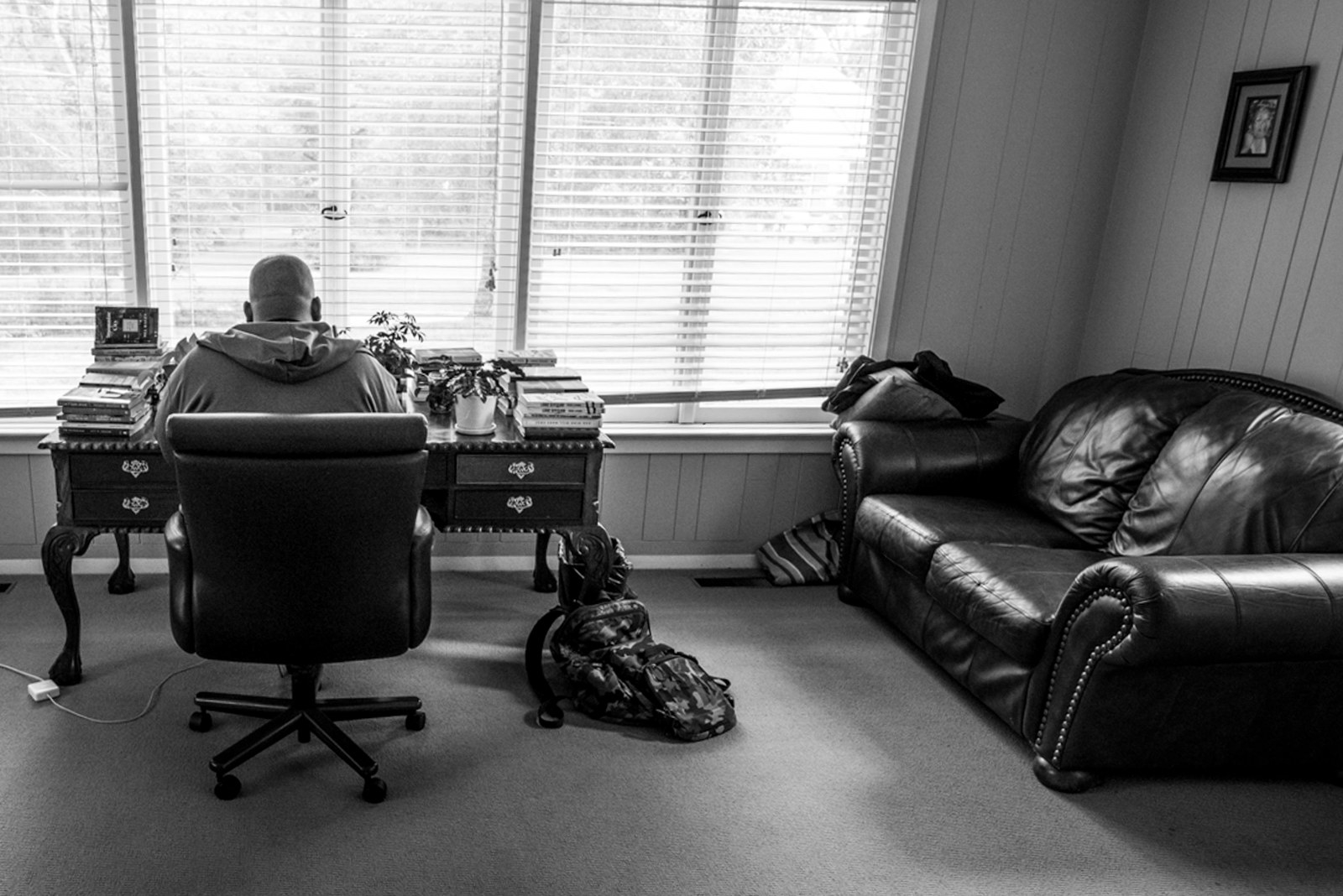
For his first two books, Laymon did it largely alone. After an editor at Putnam Penguin asked if he would tone down the racial politics and omit Katrina from Long Division, then known as My Name Is City, he took both books to an independent press, unagented. (“I signed a terrible deal,” he says. “I signed away all my fucking important rights.”) When the books did very well, several agents approached him, and Laymon eventually went with PJ Mark at Janklow & Nesbit. Together, they sold his memoir at auction. Heavy was the first time he had a really collaborative relationship on a book.
Now, he works with his editor at Scribner, Kathy Belden, who credits another of her writers, Jesmyn Ward, for bringing Laymon to her attention. She says Laymon “changed the way I think about love.” She bought 10 copies of each of his previous books and distributed them at work. “I'm not a religious person but I understood how people might respond to the way [they] do to religious text because it has that kind of effect on me.” The proposal for Heavy came to her in July 2014 and she saw a first draft a year later. They’ve been in collaboration throughout. “I’ve got tag team partners in my editor and my agent who [are] definitely invested in the health of the work,” Laymon says. “They’re both white, so I have to think about that all the time and what that means, but what I love about them is that they are thinking about what that means.”
“I just wanted to write a book, to my mama. Really, to my mama. And then have the world figure it out, if they want to.”
Laymon speaks glowingly of the process, of being reeled in when things threatened to get meta. “I needed someone to say, c’mon bruh, that’s interesting to one person on Earth and that would be you,” he says laughing. At one point, he included a transcribed essay he had written at 12 years old, and put it in the book in full. “Part of that is like this unearned fascination with yourself as a young genius and shit,” he says laughing even harder. He likens that urge to dazzle to hip-hop. “That’s that rapper shit!” he giggles. “Whole songs about how dope you are now, or how dope you were 20 years ago. For us, you can’t do that. But I’m interested in seeing that — the boast essay. I would love to see an essay that’s like straight boast.”
When I speak to Belden, she remembers a lighter lift. “I feel like I didn’t do anything,” she says. “I honestly feel like I gave him some feedback along the way, but he revised and revised and revised and it emerged, like, you know, clearing the steam off a window. It was an unusual editorial process on my end.”
“I just really wanted to work with Kathy,” says Laymon. He reels off the names of some of his accomplished stablemates: Rachel Kaadzi Ghansah, Mitchell S. Jackson, Lacy Johnson, Sarah Smarsh. “Those are all people who, beyond being on the same publisher, or having the same editor, they do things I just can’t do as a writer. So, I just like being a part of that squad.”
Laymon likes the idea of writerly camaraderie. “I feel like I’m on three different squads,” he says happily. “You know, that young cadre of people who are poets but they do other shit, like Eve Ewing, and Clint Smith, and Jericho [Brown] ... I’m not a poet but I still feel like so inspired by them, that I wanna be down with them. Like, they got all their fucking capes and shit and I’m that nigga in the back, like, can I come?” Poet and academic Ewing is full of praise for Laymon’s generosity — he taught one of her poems, “Requiem for Fifth Period and the Things That Went on Then,” to his students. “It was the first time a writer I admired that I didn’t know personally gave me any professional acknowledgment,” she says. The quality of Laymon’s writing that appeals to her lives outside the Cartesian idea of knowledge. “He makes space for feeling as a form of knowing. That’s what characterizes his work: love, the stomach, the heart.”
“He makes space for feeling as a form of knowing. That’s what characterizes his work: love, the stomach, the heart.”
Laymon’s other crew is one he calls his “people-people” squad, featuring writers Darnell Moore, Mychal Denzel Smith, and Marlon Peterson. Smith first encountered Laymon via Gawker and pitched an essay to him not long after. Through a letter-writing project spearheaded by their mutual friend Moore, Laymon invited Smith to Vassar — to read the letters. “He is so giving with his time and effusive with his praise,” says Smith. “Kiese loves the shit out of black folks. He rides so hard for us. And when you’re in his particular orbit, the love is just so much stronger.”
Smith believes the quintessential element of Laymon’s writing comes from his habit of repetition and revision. “He’s not just doing it as some sort of literary trick. It’s always getting you to come back to the grittiest and heaviest part of the work and making you sit with that, because it’s uncomfortable, because he knows you want to look away. He’s like, we all need to be reckoning with this.”
And then there’s Laymon’s squad of Southern writers that includes Jesmyn Ward and Zandria Robinson and Regina Bradley. “Regina is on the cusp of everybody knowing her,” he says. “We have a very literary state. From this motherfucker down here” — he gestures downhill to Rowan Oak — “to Tennessee Williams to Richard Wright. Angie Thomas? She’s from Jackson. There’s a lot of young poets coming out of Mississippi.”
He urges me to read Aisha Sabatini Sloan. “She wrote Dreaming of Ramadi in Detroit,” he says before spelling it out patiently, a teacher’s tic: “R-A-M-A-D-I. It’s an amazing book.” Sabatini Sloan is herself a fan of Laymon, having worked with him at Guernica, and she finds his skill at tackling emotional subjects impressive. “It could potentially sound pat but his honesty becomes an aesthetic asset. He finds a way to bend around things that might otherwise turn into stark emotional or political cliches,” she says. “He’s one of the most inspiring people when it comes to taking personal responsibility.”
When I speak to Imani Perry, the Princeton professor Laymon calls “the most influential thinker in my life,” she points to the recent honor bestowed on him by Chokwe Antar Lumumba, the mayor of Jackson, and points out his very particular position as a “post–civil rights, urban black South writer.” Laymon’s southern identity and traditions are rooted in the Deep South as well as intellectual, internationalist politics, Perry says.
The story of black Southerners being inferior is not one of their own making, she continues, and Laymon gives voice to that. “Kiese doesn’t pretend that trauma and wounding hasn’t happened. All of that is present: trauma, wounding, hurt, legacies of pain. At the same time as this really deep-seated self-love and self-regard. That’s part of what I see as so special about his work.”
She continues, “He does this thing where he is very much in the present moment but also is grappling with inheritances, of legacies, constantly. And for me, that’s distinguished in part because so much of what we get now is, ‘Well, this person is going to be the next James Baldwin or Toni Morrison.’ He’s a very distinctive voice and yet you can hear the genealogy in his work. He’s Kiese Laymon. He’s not the next anything else.”
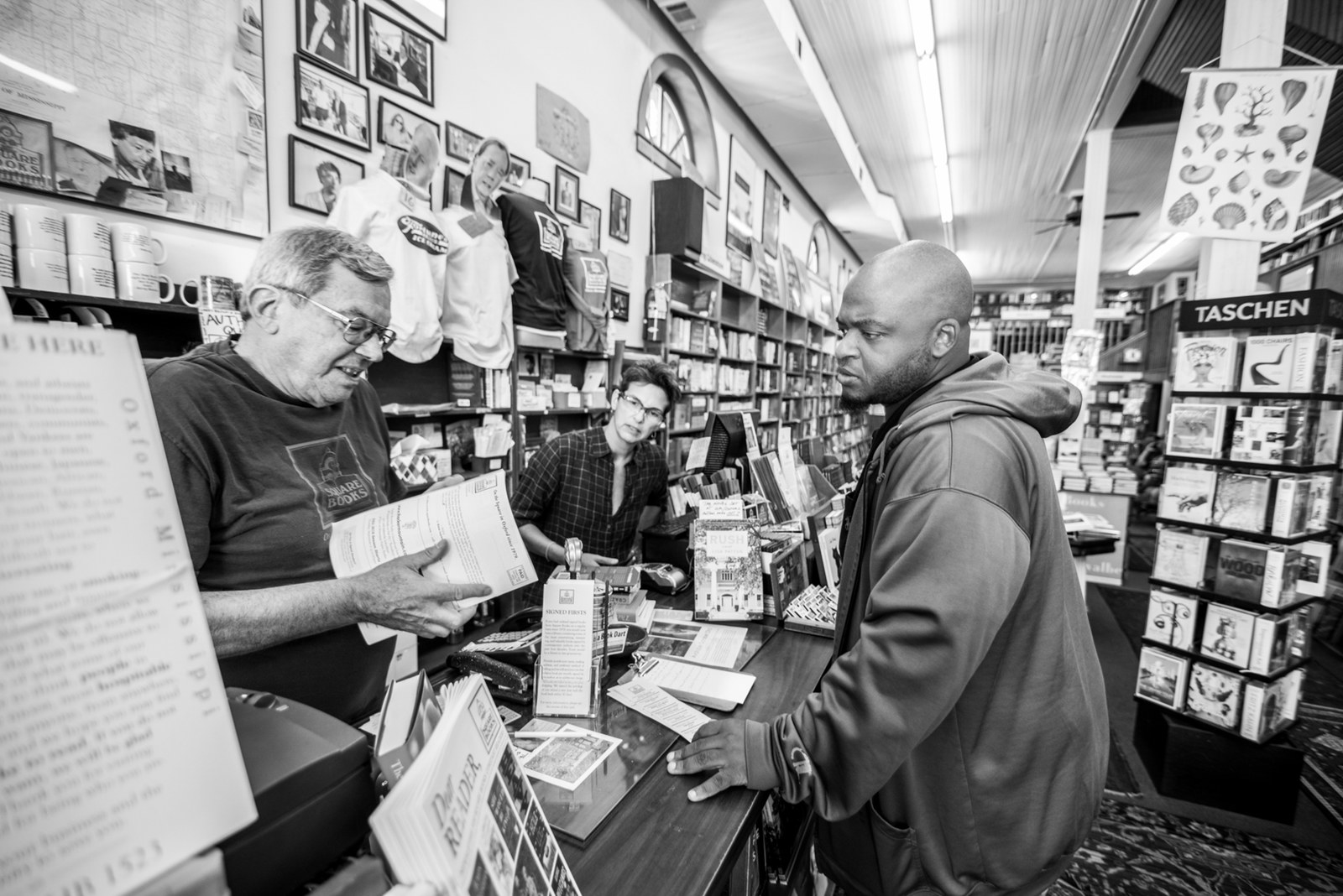
When I attend one of Laymon’s classes at Ole Miss, the air conditioning unit is loud and frosty, but the class is present and buzzing. Next week they will be talking about Donald Glover’s TV show Atlanta, but today they are discussing Octavia Butler’s Kindred, a book a fair number of them had not read until it was assigned by Laymon, and which had served to inspire parts of his own first novel Long Division.
There are women all over Laymon’s work: in his books and his essays, in the list of writers and thinkers he recommends, in the reading he assigns in his class. I idly praise him for this, and he’s off, expressing bafflement at the people who do not verse themselves in women’s — and especially black women’s — art. We alight at Kanye briefly. “It’s one thing not to invest in black women’s art,” he says, “[but] it’s another not to invest in black women who have taken your art and fucking done some dope shit with it. I’m not just trying to call out Kanye but I’m saying, if he just read black women’s art or listened to the black women’s art that he inspired... But the motherfucker never even looked back. When you’re a black writer, my G, and you’re not reading black women... Black women are the ones who are really engaging with you, you know?”
“He’s Kiese Laymon. He’s not the next anything else.”
We end up speaking about “Revolutionary Hope,” the famous 1984 conversation between Audre Lorde and James Baldwin. “I teach that shit every year, regardless of whatever we’re doing,” he says. The lesson is that even the greatest essayist in the world needed to be schooled on gender politics. “Like, how many times has Audre Lorde had that conversation with a black man? You would think she wouldn’t have to have it with this particular black man.”
The class talks about Kaepernick and Nike and Serena and anger and blackness in corporate sports. Laymon is a laid-back teacher — as laid-back as typed notes and discussion points can be, anyway — and his students (a mix of undergrad and graduate students) bat ideas and positions back and forth for more than an hour. Afterward, he hangs around with students for a little bit, talking some more about Kindred, one student’s soon-to-be-published poetry, and eventually and reluctantly, his own book. Their excitement and pride feels tangible. That pride goes far: I spoke to one of his very first students at Vassar, Atlantic writer Adam Serwer. Serwer was 19 when he met Laymon in 2001, and remembers a varied required text list including KRS-One’s retrospective, Danzy Senna’s Caucasia and Jay-Z’s The Blueprint. “Kiese was more than a teacher to me,” he wrote in an email. “He was a mentor. I probably wouldn’t be a writer without him.”
Laymon’s class discussion is peppered with questions of labor, capitalism, white supremacy, and the acknowledgment of power structures that seem insurmountable. He’s fully aware of how his book is caught between its twin identities — art and essentially, product. Even now, with a great editor, marketing support, and as much access as a writer can hope for, there is still an element of business as usual. “I’ve been getting a lot of starred reviews for [Heavy], and sometimes when they describe what they read it doesn’t match up with what I wrote,” he says. “And it seems like sometimes they’re just grasping for all of the clichés they know about blackness and pain and regional blah blah and throwing it into a review. You read that shit and you’re like, that’s not my black book, that’s some other black book you read.”
Understanding the marketplace and its appetite for black pain means a constant weighing is taking place. It doesn’t mean you shut up and put up — critiquing institutions is in his DNA, and it’s what he’s teaching his students.
“You say anything critical about the places giving you a check, they might stop giving you that check,” he says. “But the fucked up thing is like, we sort of have to.”
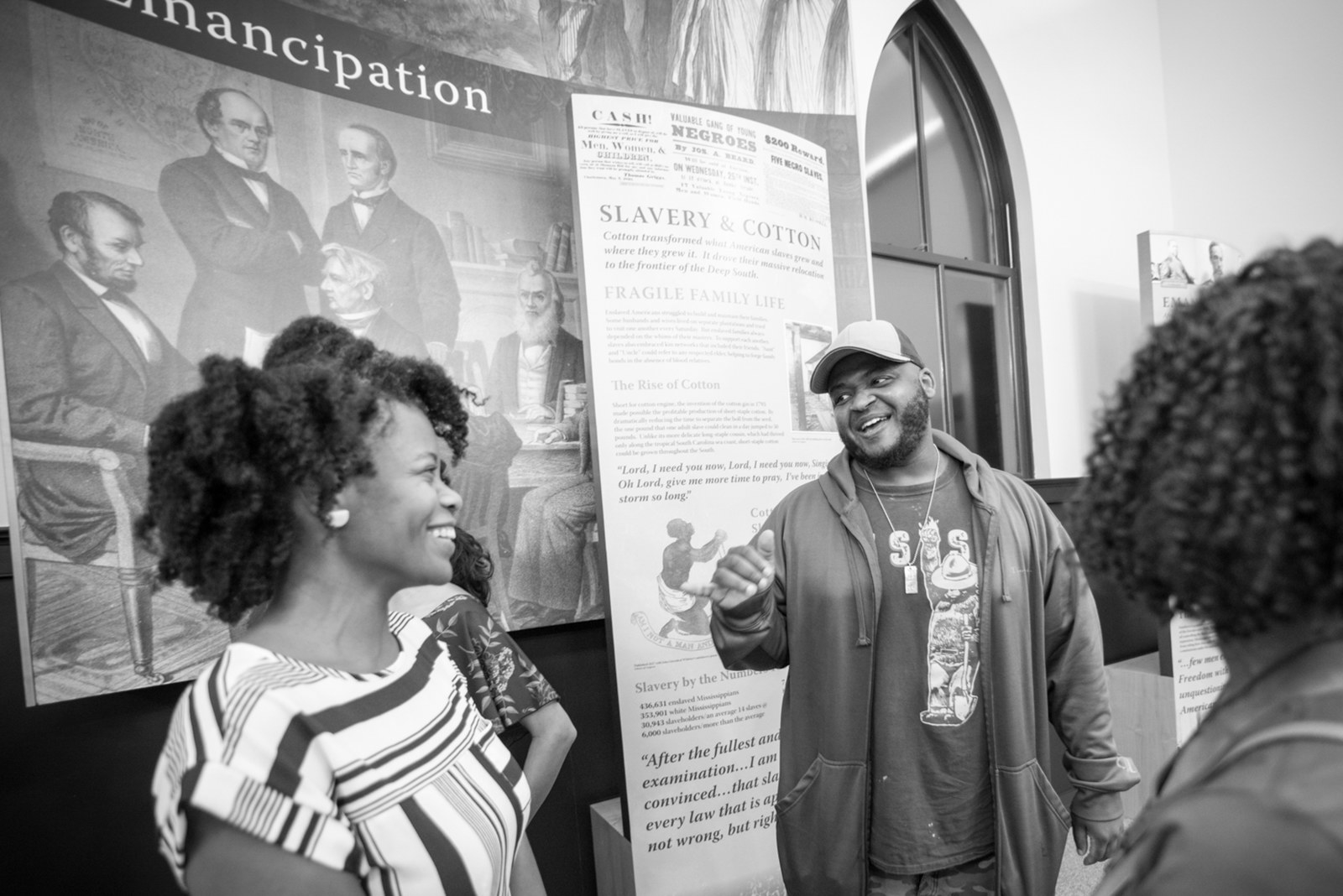
In Courthouse Square, not far from the world-famous Square Books, where Laymon will be doing an event later this month, stands the Confederate monument he told me about when I arrived. The inscription details its origins and purpose: “a loving tribute to the memory of our dead heroes...” At the foot of the statue, somebody has placed a book of Martin Luther King Jr.’s quotations, carefully preserved in a waterproof Ziploc bag. On the book’s cover, MLK’s face is rendered in black and white above his signature. The statue is hardly the only Confederate monument in the vicinity; the Ole Miss campus is home to at least one other.
Laymon rolls his eyes when I tell him of my visit to the statue in the square. “If I do leave this school, part of it will be because of what they have decided to do with their Confederate monuments,” he says. “The thing about Mississippi is that you could take that shit down and you could put up a statue of Ida B. Wells. You could put Fannie Lou Hamer, or Emmett Till…” The university’s defense — “contextualization” — doesn’t wash with Laymon. “I love my state, but that’s part of what makes it hard to go to sleep at night and wake up in the morning: living around people who have the choice of commemorating loving, legit freedom fighters. Come on, man. It’s not even that difficult.”
“Is reckoning public work? That’s what I think is the question of this book.”
Laymon is hoping “that people will do the work that I’m trying to begin myself or that I’ve been taking part in.” As is his wont, he won’t stop circling and revising his position on its usefulness. “The question is, does that work? Is reckoning public work? That’s what I think is the question of this book. In some way, it performs a kind of public reckoning, but is reckoning that is liberatory ever really public? I don’t know. I’m not sure.”
The signs are that Heavy will do very well with critics and readers, and Laymon will embark on a press tour, leaving behind his classroom for a time. When I ask if he feels called to teach, his answer goes on — largely without pauses:
“I was supposed to be a teacher. That’s what I know I was supposed to do. My mom is a teacher; my grandmama taught Sunday school; both my aunts are teachers. The art of teaching, I love it. Because in my heart, I really believe if somehow we could get the most dynamic, kind, loving teachers in the world in every classroom in the country and give these motherfucking teachers all the resources they need — pay them right, give them the best benefits — I literally think we could change everything about the world. In my heart. I know people are like, ‘It’s not about education, it’s about policy.’ Fuck that shit. In my heart, I think it’s education. I think the writing I try to do, that’s sort of education. But it’s hard to even get there when most of these schools don’t have enough resources. These teachers aren’t being paid shit. And even the teachers that are being paid well: Are they really versed in actual liberatory fucking understandings of the world? I don’t think so. Not usually. I believe education could change all this shit, and because of that, I love teaching. I’m a teacher, man. That’s my main thing. At this point in my life, I make more money writing, but in my heart, teaching is my thing. I’m a teacher, man. That’s my main thing.”
The mildly condescending adage is: If you know better, you do better. Its efficacy has been mixed in Laymon’s life. As a hardheaded black boy and son, there were times he knew better and went ahead and did it anyway. As a man, he is aware of the hurts he has inflicted on people, especially those he loves. As a teacher, he is constantly asking questions, and when the answers come, he is revising, revising, revising. Heavy is in itself an interrogation of Kiese Laymon, by Kiese Laymon. ●
